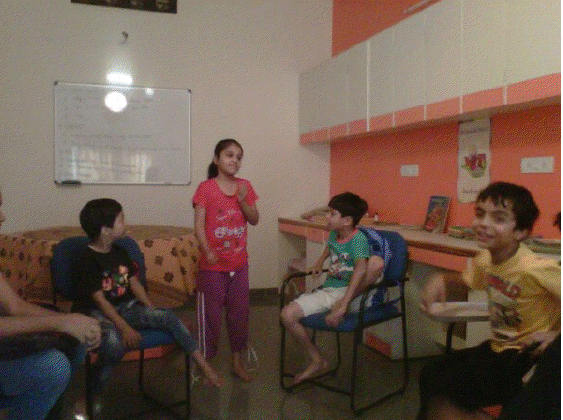Simple tips on how to memorize and recite a poetry
Charge of the Light Brigade – Cannon to the Right of them, Cannon to the Left of them, Cannon in front of them, Volley’d and thunder’d; ….I still remember this poem which we had to memorize in the classroom and as we teach our kids Literature, it is very important to explain about the poet and in which context the poetry was written. Another thing important is teaching children how to recite the poem. We almost find children saying poetry or a story with no expressions and in a hurried style with mugged up learning. It is important to know the meaning of the poem and recite in a way which becomes interesting to the listener. When a child have to recite a poem, it may so happen that he may skip off words or a line and when prompted, he continues reciting. Reciting poetry is much more than memorizing. Reading aloud confusedly mars the experience of the listener but well said poetry can carry a good emotional rapport.
When I teach poetry in the class, it is more than memorizing. Expressions have a way in recitation. So do the child learn the poetry in a manner that prompts with rhyme patterns and meter that make it easy to flash memory.
Here are some simple tips on how to memorize and recite a poetry. You can help the child with slow and gradual progress which even makes them learn and recite poetry from school syllabus. It even becomes an interesting learning and teaching experience as well.
1. Understanding the poetry: When children are taught poetry, first explain the poetry. Talk about the Poet/Author and when or why he wrote the poetry. A brief biography of the poet will make interesting poetry session before they memorize the poem.
2. Natural Tone : Maintain the voice tone. Ignore punctuation or breaks and pauses. Recite quite normally in a natural voice with no excitement or pitched up voice throughout recitation. However, to be expressive, vary pitch and volume though in a natural tone instead of being hyper.
3. Focus on Phonetics: A read aloud Poetry can be interesting with focused phonetics. Check those ‘vowels and consonants that can be spoken with clarity of voice. Using right language leave impressions and makes the child feel better to hear his own clear, well pronounced voice.
4. Be Expressive : Most of the time, children are not expressive when reciting poetry and they speak aloud the mugged learning. It so happens, they fail to remember and when prompted, they can finish the stanza. It also turn them up being embarrassed when reciting in front of an audience and they forget in-between the lines. Facial expressions and hand movements understanding the poetry lines can help children to present the recital in an interesting and confident manner. Gesture is to be maintained for effect.
5. Write and re-write revision: Children can write and re-write the poetry 2/3 times in their scrap with supportive drawing and coloring. Let them identify the parts they find difficult to remember. Help them visualize the poetry and what it is about. Help them plan where to pause and stop with smooth flow to continue. Avoid sing-song tactics.
6. Easy Recitation : For easy reciting on the stage, slow down. Speaking aloud faster tends to make the child forget as they easily get distracted at times. Slowing down helps them gain confidence and be less nervous. Even the audience will love to enjoy listening.
7. Rote learning : Some children love to learn repetition. Go back to the rote learning nursery rhymes and have fun for a while. Even sing along rote songs like ‘In a cottage, In a wood’, skipping every one line while they enjoy action. Rote learning and visualizing helps faster learning and memorizing.
8. Posture and Dressing: A well dressed child is always confident. And, the posture comes with confidence. Help the children to possess good posture and dressing while they are ready to perform. A well presented child on stage leaves impressive image to the audience.
9. Eye Contact: The most important part while reciting on stage is eye contact. Some children look down while saying the poetry. Some tend to look here and there and than get lost in imagination or get distracted. This leads to nervousness and forgetful. While recitation is on, the eye contact should be beyond the audience and even turning towards sides towards the audience as if to capture all of the listeners.
10. Never get embarrassed: Children often tend to make mistakes. Never get embarrassed and pass on your vibrations to them. Patience is always a key to success. Never tell the child to say, “I’m sorry’ as apologizing messes up and they lose interest in poetry and memorizing becomes a pain for them.
How often we run away from the things we don’t like yet have to do? When I learnt Tennyson’s poetry, I still remember those lines “Cannon to the Left of them, Cannon in front of them, Volley’d and thunder’d; ….” and smooth went on reciting the poetry and having fun too.
Well, 6th August was a day to remember Alfred Lord Tennyson and interestingly, he was known as Lord because of the Peerage titles I guess just like Lord Byron.








